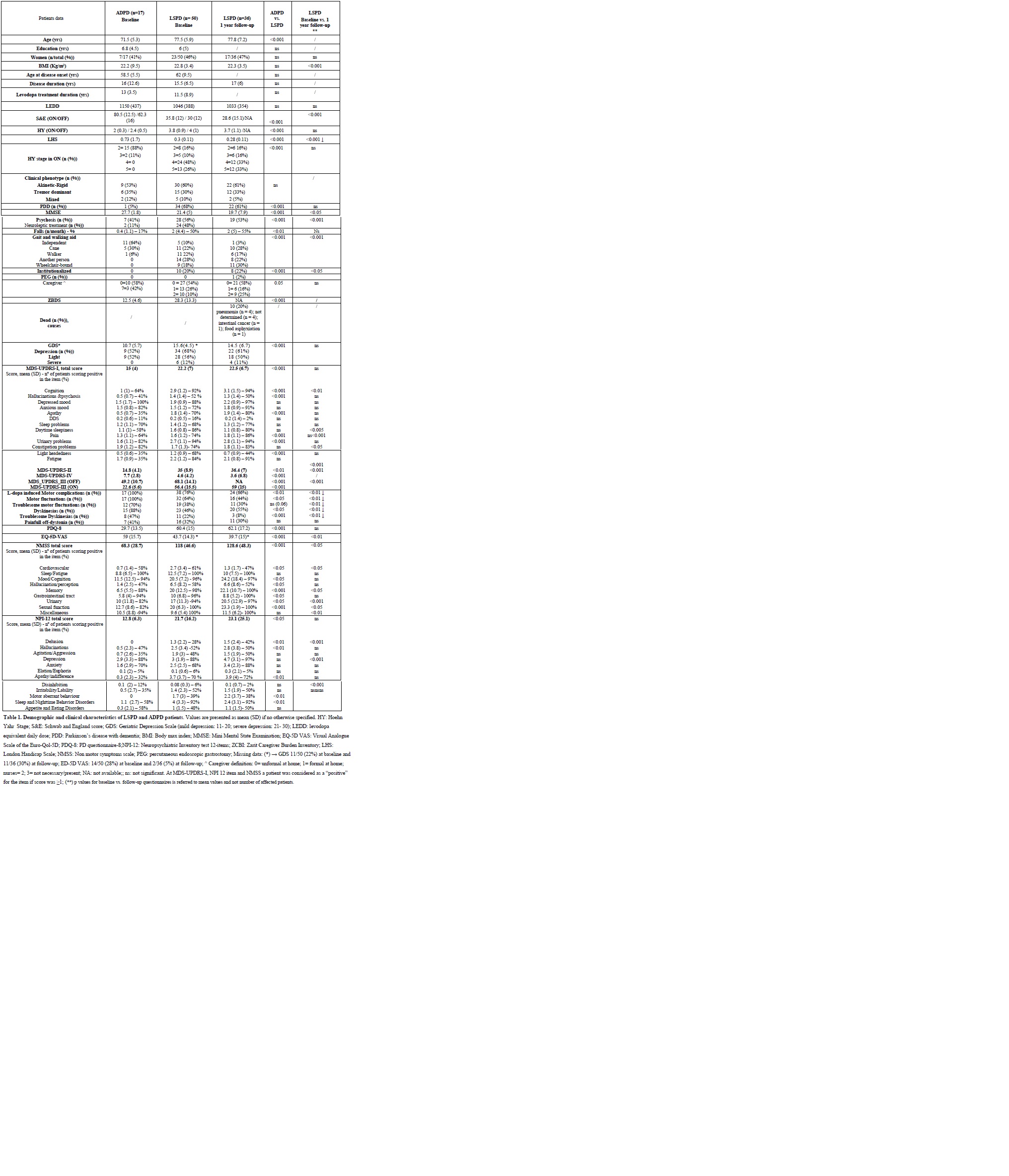Session Information
Date: Saturday, October 6, 2018
Session Title: Parkinson’s Disease: Clinical Trials, Pharmacology And Treatment
Session Time: 1:45pm-3:15pm
Location: Hall 3FG
Objective: to evaluate the clinical progression and prognostic factors of a late-stage PD (LSPD) population.
Background: Parkinson’s disease (PD) disability milestones emerge in an exponential manner at a late stage disease [1]. Few data exists on the rate of clinical progression and prognostic factors for patients who have entered a very late stage of disease [2].
Methods: 50 LSPD patients (Schwab and England ADL Scale <50 or Hoehn Yahr Stage >3 in MED ON) and 17 advanced (AD) PD patients matched for age at disease onset underwent an acute levodopa challenge test and an extensive cross-sectional clinical assessment for motor, non-motor symptoms (NMS), quality of life (QoL) and caregiver burden. LSPD patients were also assessed at one year follow-up.
Results: LSPD patients present a more severe clinical picture, with prominent axial and NMS, that negatively influenced QoL [Table 1]. LSPD and ADPD patients’ MDS-UPDRS-III score significantly improved after levodopa (p <0.001) respectively 18% and 53% [Table 2]. The magnitude of levodopa response significantly correlated with motor complications in LSPD. After one-year, 20% of LSPD patients have died. Overall, after 1 year follow-up there was still clinical worsening of motor symptoms and NMS (worsening of MDS-UPDRS-III mean ± SD 7.7±10.3, NMSS 19 ± 46 and NPI 6±13), although heterogeneous [Table 1]. Nevertheless, motor fluctuations and dyskinesias improved. Functional independence worsened. Dysphagia severity at baseline significantly predicted a poor outcome (death, institutionalization or HY 5) [Table 3].
Conclusions: LSPD patients still present a significant, although heterogeneous, progression in the motor and non-motor features. Dysphagia severity was the single factor associated to progression for additional disability milestones.
References: [1] M. Coelho, J.J. Ferreira, Late-stage Parkinson disease (2012). [2] R. Cilia, E. Cereda, C. Klersy, M. Canesi, A.L. Zecchinelli, C.B. Mariani, S. Tesei, G. Sacilotto, N. Meucci, M. Zini, C. Ruffmann, I.U. Isaias, S. Goldwurm, G. Pezzoli, Parkinson’s disease beyond 20 years, Journal of neurology, neurosurgery, and psychiatry 86(8) (2015) 849-55.
To cite this abstract in AMA style:
M. Fabbri, D. Abreu, L. Guedes, M. Rosa, A. Antonini, M. Zibetti, L. Lopiano, J. Fereira, M. Coelho. Dysphagia predicts poor outcome in late-stage Parkinson’s disease [abstract]. Mov Disord. 2018; 33 (suppl 2). https://www.mdsabstracts.org/abstract/dysphagia-predicts-poor-outcome-in-late-stage-parkinsons-disease/. Accessed December 15, 2025.« Back to 2018 International Congress
MDS Abstracts - https://www.mdsabstracts.org/abstract/dysphagia-predicts-poor-outcome-in-late-stage-parkinsons-disease/



